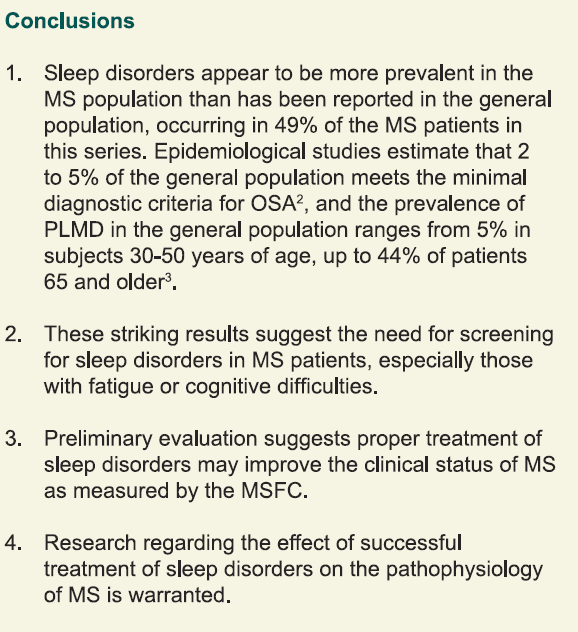
The MS physicians at RNI have known for some time that MS patients have a higher prevalence of sleep disorders, especially sleep disordered breathing and sleep apnea, than the general population. In a poster presentation at the Sleep meetings back in 2004 they showed that over 50% of a series of MS patients at RNI had a sleep disorder diagnosed by polysomnography (overnight laboratory sleep study). The study also showed that patients with OSA had improved scores on the PASAT3 portion of the MSFC after treatment with CPAP. The conclusions from that poster are shown in the box.
More recently there have been several publications in the medical literature confirming the high prevalence of sleep disorders in MS patients, and also demonstrating the improvement in MS symptoms, especially fatigue, with treatment of sleep disorders.
There are studies aimed at identifying the reasons for the high prevalence of sleep disorders in MS patients, but no definitive cause has yet been identified. The most recent Scientific American has a very interesting article on the serious health consequences of sleep deprivation, which will be the subject of a future blog.
However, most importantly, regardless of the cause, all of these studies point to the importance of MS patients being screened for sleep disorders. In MS it is essential to have overnight sleep studies in a laboratory, because often the sleep disorders that MS patients have are complex, often including nocturnal spasms, restless legs and/or periodic limb movement disorder, or a milder form of sleep disordered breathing, called upper airway resistance syndrome, and other disorders that can not be detected in a home sleep study.
And it is especially important that MS patients with symptoms of fatigue be evaluated for sleep disorders by a Board Certified Sleep Physician. Fatigue is one of the most cited MS symptoms that interfere with activity and reduce quality of life for MS patients. It is a treatable disorder, and diagnosing and treating sleep disorders can greatly improve the quality of life by reducing fatigue and potentially improving cognition.
The RNI poster can be viewed at sleep poster.